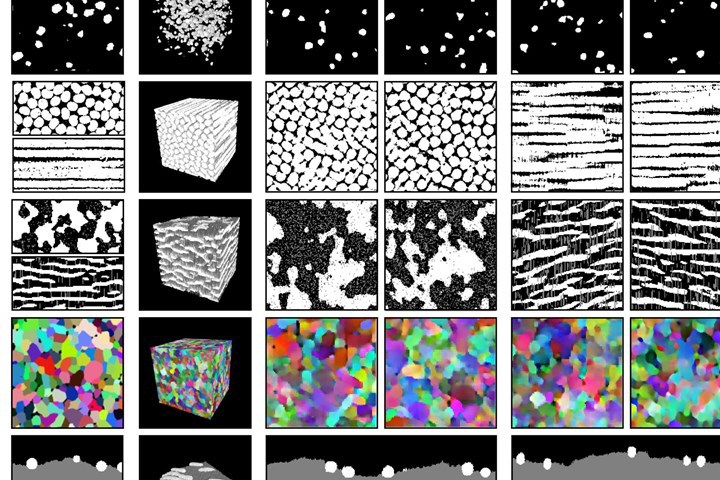Prepregged Carbon Fiber
Prepregs, short for "pre-impregnated" fibers or fabrics, are composite materials where reinforcement fibers are pre-impregnated with a precisely measured amount of resin or matrix material. This meticulous preparation ensures an evenly distributed resin content, optimizing the material's properties and handling characteristics. Commonly used in aerospace, automotive, and sports industries, prepregs offer controlled curing schedules, allowing manufacturers to tailor the material's performance by adjusting factors like temperature and pressure during the curing process.

Latest Prepregs Articles
VIEW ALLSmartbeam develops HMS-embedded composite profiles for space
Project goals adapted filament winding to properly integrate optical and carbon fiber sensors and meet technical requirements, resulting in a verified, simplified process for smart composite structures at reduced cost.
Read MoreTechnical textiles, prepregs, composite parts and multilayered materials
CAMX 2025: BGF Industries is highlighting its range of versatile woven products for composite reinforcements, with materials, parts and literature available for viewing, as well as those from parent company Porscher Industries.
Read MoreMaterials portfolio elevates composites scalability, sustainability
CAMX 2025: Scalable, eco-conscious mobility is Mitsubishi Chemical Group’s strategic focus, which it highlights through a display of materials from PAN precursor to prepregs, and an EV battery case demonstrator.
Read MoreHTMS joins Mobilise accelerator program to advance its CMC materials
High Temperature Material Systems has developed low-temperature cure prepregs for ceramic matrix composite (CMC) parts offering lightweight and thermal/fire protection up to 1000°C.
Read MorePrepreg innovations commit to cost, energy consumption reduction
CAMX 2025: PRF Materials is highlighting Reepreg, its novel Q.tool recycled innovation and will be providing updates on its Product Development and Innovation Centre.
Read MoreSemipreg commingled thermoplastic towpreg enables more uniform ply buildup, flexible fabrics
CAMX 2025: Concordia Engineered Fibers exhibits its semi-consolidated towpreg innovation that reduces the bulk of commingled towpreg while maintaining a more flexible tow than fully consolidated prepreg.
Read MoreKnowledge Centers

ÂÌñÏ×ÆÞ’s CW Tech Days: Infrastructure event offers a series of expert presentations on composite materials, processes and applications that should and will be considered for use in the infrastructure and construction markets.
LEARN MORE
Review the state of the art in design, simulation, failure analysis, digital twins, virtual testing and virtual inspection.
LEARN MORE
Explore the cutting-edge composites industry, as experts delve into the materials, tooling, and manufacturing hurdles of meeting the demands of the promising advanced air mobility (AAM) market. Join us at CW Tech Days to unlock the future of efficient composites fabrication operations.
LEARN MORELatest Prepregs News And Updates
Diverse advanced material solutions guide global challenge improvements
CAMX 2025: Celebrating nearly 100 years of advanced materials engineering, Toray features carbon fibers and TPC, prepreg, resin systems and other innovations through its U.S. divisions.
Read MoreHexcel, Specialty Materials launch boron fiber-infused high modulus carbon fiber
High-compression, hybridized unidirectional prepreg targets advanced commercial and military application opportunities.
Read MoreSyensqo, Vartega to advance carbon fiber circularity
Vartega progresses Syensqo closed-loop model through conversion of dry carbon fiber and prepreg waste into EasyFeed Bundles.
Read MoreMitsubishi Chemical Group prepreg using plant-derived resin acquires ISCC Plus certification
Acquiring international sustainable and carbon certification drives the MCG Group’s efforts in environmental impact reduction in areas ranging from sports and leisure to mobility and industrial.
Read MoreMaterials supplier exhibits composites technologies alongside subsidiaries
JEC World 2025: Toray Group is present in two booths this year, highlighting latest material innovations across its globally located businesses for space, hydrogen, sustainability and more.
Read MoreFormula 1 showcase car demonstrates future materials, manufacturing capabilities
JEC World 2025: SHD Composite Materials and KS Composites are exhibiting the collaboratively developed Sustainability Showcase Car, highlighting a commitment to low environmental impact composite solutions.
Read MoreFeatured Posts
A different Ox-Ox prepreg for faster, more affordable CMC options
Isovolta has developed silica fiber/alumina CERAPREG to enable ceramic matrix composite parts with long-duration service at 900°C and handling similar to epoxy prepreg, dielectric performance similar to quartz.
Read MoreHybrid composite architecture enables rigid wind propulsion solution for maritime decarbonization
GT Wings’ AirWing leverages aerospace engineering principles combined with hybrid glass and carbon fiber composite construction to deliver up to 30% fuel savings through compact, deck-compatible wind propulsion.
WatchExpanding high-temperature composites in India and the U.S.
Azista USA offers polymers and processes for carbon/carbon and other CMC, including novel hot-melt phenolic and phthalonitrile prepregs for faster cycle times, alternative solutions.
Read MorePrepreg compression molding supports higher-rate propeller manufacturing
To meet increasing UAV market demands, Mejzlik Propellers has added a higher-rate compression molding line to its custom CFRP propeller capabilities.
WatchPost Cure: Composite assemblies orchestrate smaller satellite designs, payload flexibility
CubeSats have become key to space exploration and R&T development, though they are often expensive to build and launch. Funded efforts like the DiskSat program aim at mitigating these challenges.
Read MoreAerospace prepregs with braided reinforcement demonstrate improved production rates, cost
A recent time study compares the layup of a wing spar using prepreg with A&P’s TX-45 continuous braided reinforcement versus traditional twill woven prepreg.
Read More
















